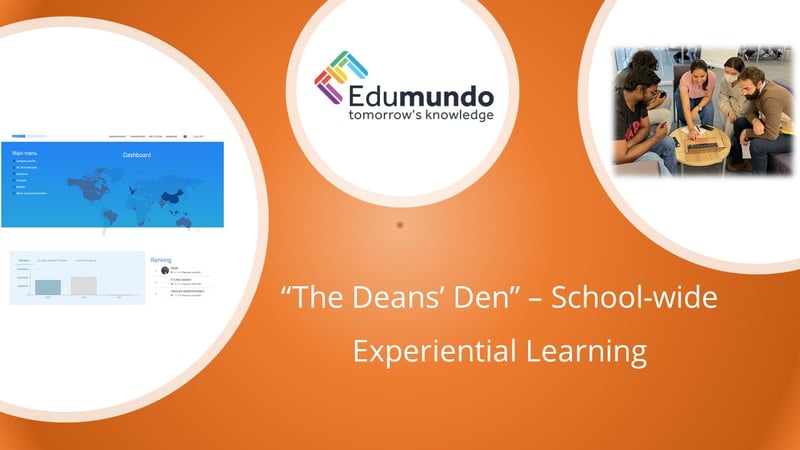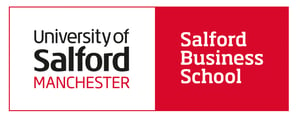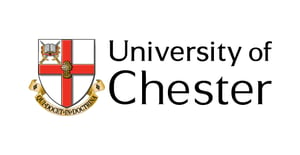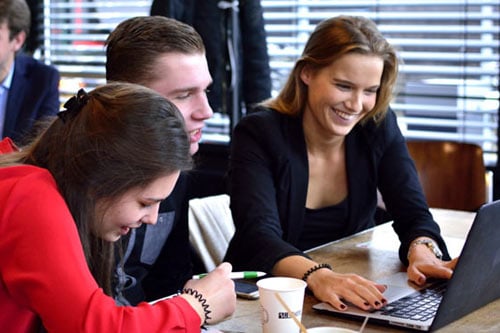"We wanted our taught students to have a deep-learning experience where at each level of their study they'd have opportunities to work with industry but we also wanted that experience to be underpinned with data-driven simulations and immersive experiences. The work we are doing with Edumundo is not a 'bolt-on' it's part of a core philosophy that we have within the school." Dr. Charles Knight, Associate Dean (Student Experience), Salford Business School
Dare you enter the Deans' Den?
Well, it's nowhere near as scary as one occupied by Dragons, that's for sure. Indeed, in our "Den", there were no pitches for investment, no fictional/estimated revenue predictions, but plenty of business expertise and entrepreneurial spirit and some "hard questions".
On Tuesday 15th and Thursday 17th February we held two sessions of the "Deans' Den" webinar. The former for the audiences from EMEA-based countries and the latter for those in Canada and USA.
We were joined by Dr. Charles Knight, Associate Dean Academic (Student Experience) at Salford Business School to explore the school's experiential learning strategy involving the use of Edumundo's business simulations rolled out across many of the school's courses. A strategy that was launched at the start of the academic year in September and is showing encouraging results in terms of student engagement and skills development.
In this blog article, we recap some of the key points and insights raised by Charles and our participants with a particular focus on his experience of rolling-out the strategy and measuring success.
Salford Business School's Experiential Learning Strategy
"One of our aims is to make sure our students graduate with the kind of graduate attributes that allow them to get into a high-paid graduate job. One of the drivers for that is to ensure students get value for money on their degree."
Charles joined Salford Business School two years ago at a time when the school was undergoing a culture change exercise.
As part of this exercise the school was looking to embrace a forward-thinking culture and mission statement. Questions such as: "who are we? what do we do and why? and how do we bring value to students?" were all addressed in determining this new culture, one that has been welcomed by staff across the Business School.
Here, Charles expanded on the School's new culture and mission statement to students:
"What we decided was that we wanted our taught students to have a deep-learning experience where at each level of their study they'd have opportunities to work with industry but we also wanted that experience to be underpinned with data-driven simulations and immersive experiences. The work we are doing with Edumundo is not a 'bolt-on' it's part of a core philosophy that we have within the school."
Another key factor behind this philosophy was ensuring students developed key skills throughout, hard, subject skills; and soft, competency skills such as team-working and analytical skills. Charles explained this aim in more detail:
"One of our aims is to make sure our students graduate with the kind of graduate attributes that allow them to get into a high-paid graduate job. One of the drivers for that is to ensure students get value for money on their degree."
School/Faculty Buy-in of Business Simulations
"We really relied on staff buy-in but also there was absolutely no problem if a staff member ran into a problem they wouldn't be blamed for it. People can make mistakes and that's okay, and that sends a really powerful message to staff."
Getting buy-in from all staff for the new strategy was not compulsory but encouraged through empowering staff and devolving the use of the simulation to them through the support of Edumundo. Charles explained:
"We trust the expert academic in the room so we didn't impose simulations on them. What we made clear is that this will improve student engagement and not increase their workload. We also asked academics to map-out where a simulation could be used within their schedule so they could see how it could fit in. All staff that used simulations did so voluntarily."
On the topic of staff workloads, one of our participants asked:
"How did this not change academic staff's workloads?"
Here was Charles' response to this:
"Their role changed to be more facilitators of the exercise rather than instructors. Students learnt from the activity itself and through the guidance of Edumundo so this freed-up Academics' time usually spent in prepping and delivering lecturers, workshops, seminars etc."
This was not only a careful consultation exercise but also meticulous in how, where, and when simulations could feature in the course and ensuring the exercise integrated with assessment goals.
"The other factor was looking at the adjustments to assessments so they better mapped to what skills they developed in the simulation to then ensure those skills were tested and learnt through their assignments."
Simulations for Student Recruitment, Onboarding, Engagement & Retention
"Two key KPIs for us are 'progression' and 'retention'. We do comparisons on average marks, submission rates, attendance year-on-year to monitor overall performance."
Salford Business School also promote the use of business simulations in their marketing efforts to recruit students to the school, ahead of or instead of their competitors.
"The UK market is very competitive so you have to be very clear in what you offer in your marketing for prospective students. One of our promises is that students will learn from real-world data and have simulation experiences that will emulate what they'll do in the workplace. At recruitment events we can articulate and visualise how this will feature."
Charles went further to explain why he thinks this appeals to students:
"Simulations appeal to millennials because of the technology and gamification. They are interested in this experience because it gives them something they really appeal to."
Another factor is engagement. Practically all Academic and Teaching Staff in Higher Education consider how to improve student engagement and also measure and evidence this engagement. Charles' approach addresses this through ongoing data collection linked to students' participation in the simulations:
"Simulations help to provide another data-set that you can use to monitor for student engagement purposes. I helped develop processes within the school to monitor trends throughout the academic year and we cover qualitative commentary directly from students. So we look at whether it improves student engagement, looking at analytics in our VLE (Blackboard), we look also at overall pass-rates, and assignment submissions on-time."
Students are also drawn to the realism of the exercise itself and awareness that this is a great opportunity to apply theory they have covered. As Edumundo's host, Leon Lloyd explained:
"What we find is that simulations are used to apply theory and concepts to relevant contexts. So they're applying this to realistic businesses, facing realistic challenges. Students grasp this opportunity to apply theory and concepts in this way because they recognise and embrace this business environment as it's very similar to what it will be like in the workplace and what will be expected of them."
All students also receive a certificate of participation on the simulation exercise, as well as a winners' certificate to those who scored the highest points. Students are also able to 'share' the certificate directly on LinkedIn, further boosting their professional profile when they start looking/networking for employment opportunities.
Good student engagement also reduces the risk of drop-outs so student retention plays a key part in the School's strategy.
"For our non-traditional students, university is a really strange place. Their family members have never been. There's new terminology, new customs. Simulations are really good because they help non-traditional and traditional students bond with one another because they're working together in groups. Research suggests students who do not engage with other students in the first six weeks are more likely to drop-out because they do not make those personal connections."
AACSB Accreditation - Evidence Learning Gain Through Business Simulations
Charles and Leon also discussed how simulations can help Business Schools in evidencing 'learning gain' one of the key criteria AACSB use in determining accreditation of a particular institute.
"AACSB look for evidence of learning and simulations can provide a very clear route to evidencing knowledge acquisition in this way," Charles explained.
One area they identified was how students, through assessment, can reflect on the skills they've learned and evidence them through written assignments and/or group presentations. For instance, reflective assignments where students are able to coherently and accurately demonstrate why their company in the simulation performed the way it did will show evidence of their own analytical skills.
Developing Graduate Attributes/Employability Skills
"There is this ongoing question about whether we make students ready for the world of work. Simulations are a good way of evidencing this because the skills required to be successful in the simulation are well known in the workplace."
Preparing and equipping students with core employability skills and graduate attributes that potential employers seek was also a key component of the Business School's philosophy. This also played a key part in their decision to adopt business simulations across the School, as Charles explained:
"Fundamentally, for me, as an institution I want my graduates to go to a job interview and when they're put on the spot about a project they've undertaken, I want them to be able to talk about either a project with an external client or where they've used real-world data in simulations to put into context what they've learned. This is really powerful, easy for them to talk about and more interesting for the interviewer."
During this point in the discussion one of our participants asked:
"Are simulations a good alternative to internships?"
Here was Charles' response: "Internships are really interesting. We have large numbers of international students who come to the UK on a student visa where they can undertake an internship. So with simulations we tend to use them alongside an internship, however where students aren't able to afford an internship simulations are a great tool and experience for such students."
Q&A Session - A time for "Hard Questions"
We received some great questions from our participants on both sessions. Charles, in particular, asked for and enjoyed answering what he called "hard questions". Here were two examples of those posed to Charles during the Q&A session that took place towards the end of each session.
- "Do you have trouble incorporating simulations into online versus more traditional face-to-face courses?"
"No. During the pandemic, Salford went from a mixture of face-to-face, online delivery, to a hybrid model, as well as hi-flex (where students had the choice). If you're going to revert to online, think carefully about how the group setup would work. There are some challenges but good planning can resolve this and there are some things that we are going to stick with in online formats as we found they work better." - How realistic and relevant do simulations need to be?
"We go from level 3 to level 7 (Foundation through to Masters). You can kind of tweak the relevance up or downwards and tailor it to the expected learning outcomes and comprehension levels of the students. You can use them in a meta-cognition way, where they apply theoretical concepts and bring in real world data sources and question whether decisions match up to what they expect to see in the marketplace."
Thank you to all our participants and our guest speaker, Dr. Charles Knight for taking part in these two webinar sessions.
If you are interested in finding out more about our business simulations, click on the button below otherwise find out more and sign-up for updates on future webinars further down.
Did you miss the webinar? Don't worry...
View the recording or check out our recap video



.png?length=300&name=unnamed%20(11).png)
.png?length=300&name=unnamed%20(7).png)
.png?length=300&name=unnamed%20(8).png)
.png?length=300&name=unnamed%20(6).png)

.png?length=300&name=unnamed%20(10).png)
.png?length=300&name=unnamed%20(5).png)
.png?length=300&name=unnamed%20(9).png)
.png?length=300&name=unnamed%20(4).png)
.png?length=300&name=unnamed%20(2).png)
.png?length=300&name=unnamed%20(1).png)
.png?length=300&name=unnamed%20(3).png)
.jpg?length=300&name=unnamed%20(2).jpg)





.png?length=300&name=loughborough-university-logo%20(small).png)





